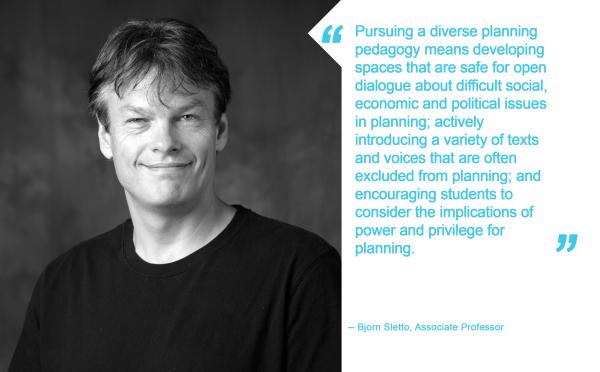Bjørn Sletto, Faculty

In this post, we hear from Bjørn Sletto. Dr. Sletto's research focuses on indigenous land rights, environmental and social justice, and alternative planning approaches, both in the United States and in Latin America. He is particularly interested in the dichotomies and tensions between local knowledge and traditional environmental management systems, and formal planning and management approaches.
What program(s) are you associated with in the School of Architecture? How long have you been at the university?
Community and Regional Planning. I have been here since August 2006.
In what ways have you incorporated diversity and equity in your teaching and research?
In my teaching, I incorporate diversity by selecting readings by authors representing voices not often heard in planning pedagogy, i.e. authors from underrepresented groups in the U.S. and authors from outside the Anglo-European academia. As part of my class assignments, I also ask my students to introduce readings from a variety of viewpoints. I invite guest speakers who are not part of the planning establishment to class (Mexican-American elders, homeless residents, graffiti artists), and I take students out of the classroom to experience urban conditions from non-privileged perspectives and places not typically valued in planning, such as informal settlements in the Dominican Republic. And I partner with activist organizations to pursue radical planning research and service learning, including the environmental justice organization PODER and the homeless support organization ECHO here in Austin.
What does diversity mean to you?
Pursuing a diverse planning pedagogy means developing spaces that are safe for open dialogue about difficult social, economic and political issues in planning; actively introducing a variety of texts and voices that are often excluded from planning; pushing students to consider the multiplicity of experiences and knowledges that characterize our communities; and encouraging students to consider the implications of power and privilege for planning.
Can you describe the sense of community at the School?
Speaking of the academic community, as a professor I find that it is collegial but also very high energy, unfortunately leaving too little time for reflective conversations about research and teaching with my colleagues. I would like to see more social interactions between students and faculty.
What are your aspirations –big or small– for the future?
I would like to see frequent, open, and productive conversations about the evolving meanings of diversity and steps that we can take to make SOA an inspiring scholarly community for all students.
